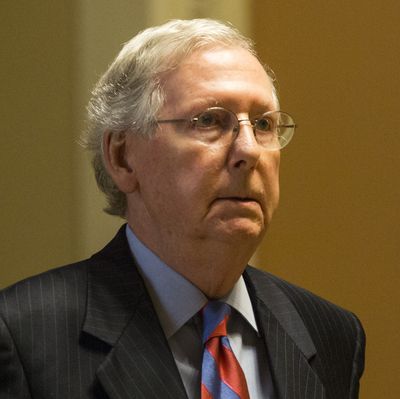
The drama on the Senate floor was palpable as the vote on Mitch McConnell’s “skinny repeal” substitute amendment neared. A previous vote was held open for more than an hour as rumors circulated among the journalists watching nearby and following on Twitter and C-Span. Was Vice-President Mike Pence in the chamber to cast the deciding vote? Was John McCain yucking it up with Democrats? Might Lisa Murkowski succumb to pressure or bribes and rejoin Team Mitch?
When the ayes and nays finally started on the “skinny repeal,” some observers figured McConnell must have gotten the 50 senators he needed; otherwise why was he forcing a vote? But in the end, Collins and Murkowski held fast against the bill, and John McCain put it down with a loud “No!” and a visible thumbs down, provoking a shocked roar among his colleagues.
It’s not yet totally clear why McCain chose to thwart his party’s last-gasp effort on health care after dramatically returning to Washington to give the GOP the final vote it needed to take up the legislation in the first place. Perhaps his confused-sounding comments calling for bipartisanship at a press conference earlier in the day — during which he and senators Graham and Johnson attacked “skinny repeal” even as they seemed to say they would vote for it — were more serious than they sounded. Maybe objections to the bill from the governor of his state really mattered. Or possibly he tired of hearing his own stirring words about the collapse of the Senate’s “regular order” from his floor speech earlier in the week thrown back at him by critics accusing him of once again talking a maverick game while carrying his party’s water.
In any event, the high drama of this vote provided a sharp contrast to the low comedy that led Republicans to this breaking point after so many weeks and months of efforts to enact health-care legislation. In January, they abandoned the “repeal and delay” strategy for dealing with Obamacare. In May, after a false start, they finally got a partial-repeal-and-replace bill out of the House on a wave of shady deals, and with the promise of Senate improvements. In unprecedented secrecy, Mitch McConnell tried to fine-tune the scheme of tax and Medicaid cuts and insurance deregulation known as Trumpcare. But its unpopularity steadily grew, its baleful effects were serially exposed by the Congressional Budget Office, and deal after deal lost as many senators as could be gained. Just this week, the Senate voted down both Trumpcare and a revised repeal-and-delay scheme, leaving Republicans with no real proposal to enact.
That is what brought the Senate to the “skinny repeal” idea, McConnell’s phantom legislation that was at best a deceptive means of kicking the can down the road to a House-Senate conference that might revive Trumpcare, and at worst (if, as McCain and others feared, the House simply rubber-stamped it) a nasty piece of work that would boost insurance premiums and deny 16 million Americans health coverage. For all the drama of the vote that killed “skinny repeal,” it was really a moment when the Republican drive to do something — anything — to claim a victory over Obamacare finally lost momentum and ground to a halt. To borrow a phrase from T.S. Eliot, the GOP health-care crusade ended “not with a bang but a whimper.”
In the shocked Senate chamber after the crucial vote, McConnell seemed near tears, furious at the three apostates who frustrated his Republicans-only process, and completely out of ideas. He instantly canceled the scheduled “vote-a-rama” series of amendments scheduled for the wee hours, and dispensed with any “final passage” vote; with the failure of “skinny repeal,” the only thing on the floor to pass was the House-passed American Health Care Act, the bill Donald Trump himself called “mean.” Even as he bitterly taunted Democrats to come forward with their own ideas, McConnell seemed to take one immediately critical bipartisan idea — funding Cost-Sharing Reduction subsidies to keep individual insurance markets functioning — off the table.
Moving from a failed effort to enact transparently phony legislation to the sabotaging of anything else would indeed be a logical next step for McConnell, and likely would put him in tune with the vengeful, destructive mood we can expect from Donald Trump the next time he approaches his Twitter account. But Republicans earned this defeat a long time ago, when they chose to pretend they could improve health care while denying universal coverage and restoring discrimination against the sick and the poor. They have also earned a long and bitter series of internal recriminations over their failure to bring down the Great White Whale of Obamacare. If the GOP chooses to blame it all on three senators who refused to vote for a bill no one actually wanted to see enacted, their road back to relevance on health-care policy will be very long.






























